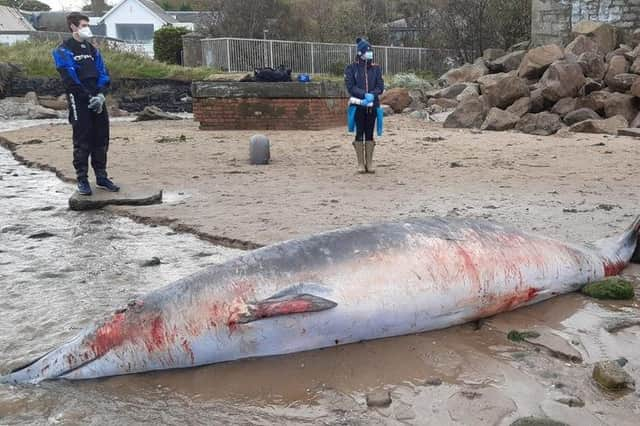Marine experts ask Ministry of Defence if naval sonar could have been responsible for Lothian whale strandings


Two Sowerby’s beaked whales have washed ashore within the last fortnight within days of each other at beaches in Portobello and Gullane.
Scientists from the Scottish Marine Animal Strandings Scheme (SMASS), part of Scotland’s Rural College, said the 14ft long, 650kg adult female which died on the beach at Gullane on October 12 was a result of entanglement, with a loop of rope embedded deep into her skin and blubber and severe trauma to the right pectoral fin.
Advertisement
Hide AdAdvertisement
Hide AdThe following day, another injured whale died at the foot of Brunstane Burn, between Portobello and Musselburgh beaches.
It is believed that naval sonar waves can frighten whales and force them to the surface too quickly, leading to symptoms similar to decompression sickness.
As a result, the Ministry of Defence (MoD) has now been asked by SMASS if naval sonar used in the recent Nato war games, Joint Warrior, was responsible as there have been an ‘unusual’ number of strandings in recent weeks.
There were three additional strandings which were identified as northern bottlenose whales of which one was in the Western Isles and two in the Clyde sea lochs.
Advertisement
Hide AdAdvertisement
Hide AdThe report written by SMASS said: "The first two cases were Sowerby’s beaked whales (Mesoplodon bidens), both live stranded on the Lothian coast and were necropsied at the National Museums of Scotland Edinburgh.
"These were both sub-adult males with significant trauma from the stranding process, but no other clear underlying infection or disease and, thankfully, no indication of entanglement, boat strike or ingestion of marine debris.
"Neither animal had fed recently but both were in reasonable body condition, suggesting an acute cause of death. Notably, both animals showed an unusually high number and distribution of gas bubbles throughout the tissues- especially lung, liver and intestinal mesentery.
"Whilst gas bubbles are not an uncommon finding during post mortem examinations, and can be a result of either decomposition or emphysema from the stranding process, a large number of bubbles, especially in deep diving species such as beaked whales, is suggestive of nitrogen emboli and decompression sickness (DCS).
Advertisement
Hide AdAdvertisement
Hide Ad"Given how sensitive beaked whales are to underwater noise, specifically naval sonar, we have to consider noise-mediated DCS as a possible cause for these two strandings. We are therefore in the process of trying to find data on sources of noise in this region, including putting a request for activity logs to the MoD following the recent Joint Warrior naval exercises.
"We’ve certainly had more than the usual number of beaked whale strandings over the past few years and it is becoming quite clear just how important our waters are for these species:- species we still know remarkably little about other than they are particularly susceptible to human impact."
A spokeswoman for the MoD said: "The MoD takes its environmental responsibilities very seriously; environmental impacts are always considered in the planning of military exercises. During the planning of the exercise Environmental Impact Assessments have been produced and findings implemented where required, such as for the use of active sonar and live weapons."
A message from the Editor:
Thank you for reading this article. We're more reliant on your support than ever as the shift in consumer habits brought about by Coronavirus impacts our advertisers.
If you haven't already, please consider supporting our trusted, fact-checked journalism by taking out a digital subscription.
Comment Guidelines
National World encourages reader discussion on our stories. User feedback, insights and back-and-forth exchanges add a rich layer of context to reporting. Please review our Community Guidelines before commenting.